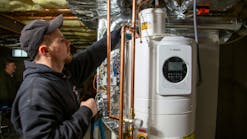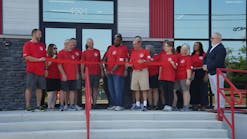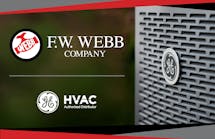Some manufacturers will shout their products from every rooftop they can find, relentlessly marketing themselves. Then there are manufacturers like Continental Industries, which quietly made its name in the HVACR business for more than 50 years by producing quality grilles, registers and diffusers, and getting them to its distributors. There wasn't a lot of hype, but they sure turned out great products. It was a formula that served the company well.
More recently, Continental has raised its voice, adopting a more aggressive approach in the marketplace. For years, the company counted on its quality products to draw in distributors ? the “if you build it, they will come” philosophy. But Ben H. Dorsey III, Continental's vice president of marketing, says owner and founder David Leiter understands that it is a different world today and that the company is now telling its story to distributors and their customers.
Originally founded in 1955 as a metalworking shop by Leiter and his brother, the company, then known as Metaline Products, took advantage of the housing boom of the 1950s by developing a line of register products geared toward manufactured housing. Its products evolved with the changing HVACR technology, adding diffusers and grilles. While the company changed its name to Continental Industries in 1979, it kept its Metaline brand for the manufactured housing market and established a new HVACR wholesale channel through its Continental Register line.
Leiter also made some key acquisitions to help fuel the company's growth. Continental purchased A&A Register Co. in 1979 and Auer Register in 1996, both based in Cleveland. In 2004, Continental expanded its product line to include venting products with its acquisition of AirJet Venting Systems of Fredericksburg, VA. Today, the Elkhart, IN-based manufacturer has a distribution network throughout North America, with its greatest market penetration in the eastern half of the United States. They distribute the AirJet line through hearth- and chimney-specific suppliers, and the B-vent portion thereof through HVACR wholesalers.
Quality products continue to be the company's hallmark, but the difference today is that this message is getting out to a wider audience. “The corporate mantra has been updated to say: ‘It's all about relationships,'” Dorsey says, reflecting Leiter's belief in the importance of reaching out to create and solidify dealer relationships. To foster such relationships, Continental has significantly revamped its marketing and sales organization. Dorsey was hired a year-and-a-half ago to lead this effort, and Mitch Baker was brought aboard as vice president of sales.
As part of this new approach, Continental has moved away from employing manufacturer's rep organizations and hired its own regional sales managers. Today, there are a total of seven of these regional managers. “That has been a deliberate move on our part and a necessary component in our sales maturity,” Dorsey says. “We want sales managers and employees who wake up with Continental on their brains.”
With a newly energized sales force and sales and marketing management structure in place, Continental immediately made a splash with dealers. In November 2006, it unveiled its new corporate logo at the HARDI Fall Conference and at its distributor cooperative (Blue Hawk) fall conference. It also launched an updated website (www.continentalindustries.com) that brought together its two separate websites, one which represented its grilles, registers and diffusers, and the other which represented its vent line. Dorsey says the website draws a diverse mix of visitors ? from contractors to representatives of government agencies and school districts. “I have to credit our advertising efforts and our attending industry events for driving them to our site,” he adds.
Continental continued this marketing campaign in 2007 with a new advertising campaign targeting wholesalers. Eschewing the traditional advertising by manufacturers touting their latest and greatest products, Continental's ad campaign instead focused on the partnering relationships between the supplier and the wholesaler. As Dorsey said at the time that the ads were launched, “We are in a growth mode and need new distributors to support the residential and commercial contractors seeking our products. That's what this campaign is all about.”
But Continental has also been selective about the wholesalers that it is doing business with. Dorsey characterizes this selectivity as a “necessary component of our marketing and sales maturity.” Instead of taking any and all distributors, Continental seeks what Dorsey calls a “few good wholesalers.”
Continental has also found success through its membership in Blue Hawk, a purchasing cooperative of independent HVACR distributors. Another Blue Hawk member recruited Continental shortly after the cooperative's formation in May 2005. “It's been an extremely important factor for us. We've gotten a lot of new customers as a result,” Dorsey says. Continental is also a preferred vendor to the WinWholesale group and has recently become an approved vendor to the Key Wholesaler Group.
In conjunction with its focus on strengthening wholesaler relationships, Continental has significantly revamped its inventory management and order-picking system to be more efficient and accommodate the company's growth. While a majority of Continental's customers order via fax, some are set up through EDI. Continental continues to evolve its MRP system to accommodate future Web-based ordering, order-tracking and related services. “We already have the Web infrastructure to support such next-generation requirements,” Dorsey says.
Even as Continental expands its wholesaler base, it has stayed close to its needs and wants. Regional sales managers remain the primary point of contact, and its customer service representatives can also take care of any issues, from shipping to inventory. “We expect our sales managers to be the experts for the markets they serve,” Dorsey says. They often poll their sales managers about how they think their customers would react to certain changes, such as a new product or a change to an existing product line.
Continental understands the importance of communications. Its award-winning newsletter, Opening Lines, started as part of the expanded marketing effort. Its annual sales conferences keep open lines of communication for employees and, in turn, wholesalers.
Dorsey also cites a simple yet very effective tool for tracking issues and recording new product ideas with its wholesalers. Continental's product and service improvement form has been an important component of the manufacturer's quality plan for the past 15 years. Think of it as an incident report. “There's a control number assigned to each report, and it is routed internally as such,” Dorsey says. “The distributors that we've had for many years have felt part of the process with this. They know they can express a concern and it will be addressed.”
With this renewed effort on elevating Continental's marketing, sales and inventory processes, one component of the company that has remained consistent ? and consistently strong ? has been the Continental products. All of the grilles, registers and diffusers are manufactured at its Elkhart plant, and its venting product line is manufactured in Fredericksburg.
“We are passionate about and committed to manufacturing in the U.S.,” Dorsey says. While the company has looked at various partnerships overseas, he says they have not found any operation that could match the quality of the work produced by its U.S. work force. “We don't want to compromise our ability to deliver quality products on time,” he says.
Because Continental's competitors rely on imported products as a way to reduce costs, the company understands the necessity of running an efficient manufacturing operation, and they've addressed this issue head-on. “We have invested heavily in maximizing our processes and manufacturing infrastructure such that we can and do produce at world-class levels of efficiency,” Dorsey says. “The phrase I like to use in relation to our product line is: Efficiently Made in the U.S.A.” That, he adds, has allowed Continental to remain competitive with the imported products.
He also cites other factors affecting its competitors that continue to turn the tide toward Continental's U.S.-made products: numerous product recalls, price increases from the competition and larger factors such as the significant rise in the Chinese Yuan. Dorsey has pledged to Continental customers that they will keep them competitive when they receive cutthroat import pricing offers from the competition.
Beyond its product quality, another key component that sets Continental apart is customer focus. Dorsey says the sales managers as well as its senior management team pay close attention to the broader HVACR market and the individual markets. “It's this focus that has led to our current breadth of product line, our current standards of quality and delivery, and to our attitude of service that permeates our entire organization,” Dorsey says. “We can see the trends.”
As part of this market focus, Continental continues to monitor HVACR systems that don't use traditional ducting or grilles, registers and diffusers. The mini-split, or ductless, systems, which account for about 20 percent of the market, and radiant heating and cooling systems are two examples of this. “We try to keep an eye on these things that would affect our future business and what we need to do,” Dorsey says. “We have to be sensitive to new markets and product ideas.”
Continental launches a few new products annually. It recently introduced an omnidirectional plaque diffuser for T-bar or lay-in ceiling applications. It provides the high volume of air diffusion found in the traditional step-down cone models, but in a sleeker look that is more architecturally pleasing. While Continental is not the first manufacturer to offer such a product, Dorsey says it has opened the door to more commercial sales for its distributors.
The idea for bringing such a product to the marketplace came from a Continental distributor. “They told us that they were getting pressure in their territory from some of our competitors and would we consider helping them out,” Dorsey says. Within six months, Continental had engineered and tested the new diffuser and made it available to distributors.
The downturn in the housing market is a concern to all businesses whose products depend on home sales and construction, and Continental is no exception. While Dorsey calls the double-digit decline in the housing market a “challenge,” he says that Continental has experienced moderate growth that he attributes to its increased distribution and market share.
As Continental continues to grow, the challenge for its senior management team will be to manage this growth. Dorsey says they are approaching its growth “prudently and judiciously.” Its investments in updating its systems and processes and adding key people are all part of Continental's growth plan that supports its ultimate mission: Producing quality products and building the wholesaler relationship. “Quality has been a passion of our founder and president for decades,” Dorsey says. “By the same token, we offer the distributor fast and dependable lead times, which lead to greater inventory turns.”
Raising Continental's voice has been good for everyone involved, for Continental, certainly, but also for distributors who are able to offer Continental products to contractors and engineers who may have previously been unaware of their options. For this, Dorsey credits David Leiter's ability to make the changes that were necessary to continue growing the company in an evolving market. “I have been amazed by his flexibility,” Dorsey says in describing Leiter's willingness to move forward on so many fronts. “He's been true to his word.”
Michael Maynard is a business writer in Providence, RI, who writes on issues related to HVACR, construction and architecture. Contact him at [email protected].
Ben H. Dorsey III, vice president of Marketing
Doug Gaugler, senior vice president of Sales
Mitch Baker, vice president of Sales
Randy Vander Ploeg, vice president of National Accounts
Jerry Crawford, controller/treasurer
Fredericksburg, VA
Gas venting systems (residential & commercial/industrial)
All fuel venting & chimney systems
Best Practice
Definition and Example: A culture of continuous improvement with the Product & Service Improvement Form (PSIF) as a centerpiece.
Significance: Has been a foundational tool at Continental for more than 15 years and has served as a primary communication vehicle between the factory and the field.
Benefits: Enables us to address ideas and concerns. Ensures that we address production mistakes and do not repeat them. Provides customers a productive route to “vent.” Instills confidence that the company stands behind its products and services.
Procedure: Sales managers, customer service representatives or customers fill out and return the PSIF, which we then assign a control number and disseminate internally with action items assigned to particular departments.
People Involved: Sales managers, customer service reps, administrative personnel and members of the senior management team are almost always involved; we bring in production supervisors and individual production employees as needed.
Timing: We route forms immediately after being assigned, and appropriate members of the management team meet at least weekly regarding ongoing issues.
Cost: Varies by the particular action plan assigned to each PSIF.
Other Considerations: Customer service representatives or sales managers are responsible to provide ongoing feedback or issue resolution to customers.








